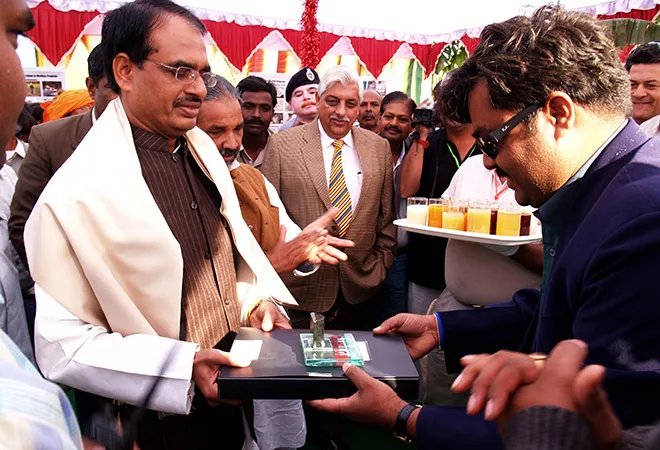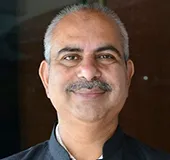
The countdown for the 28 November Assembly elections in Madhya Pradesh has begun. The BJP has been winning assembly polls in the State since 2003. Under Chief Minister Shivraj Singh Chouhan’s leadership, the BJP won 2008 and 2013 State assembly polls and won a bulk of parliamentary seats too. The BJP has been performing consistently well in the civic polls too.
Chouhan’s strategy
Chouhan, 58, has a sensitive approach in formulating welfare schemes. Popularly he is addressed as “mama” (maternal uncle). The chief minister has a rather insatiable hunger to interact with masses and people of all hue and shades. As per one estimate, Chouhan, in his past 13 years as chief minister, has led over 50 yatras. During his yatras, Chouhan often even forgoes to complete his meal in order to meet others. These yatras are favourite with Chouhan as it gives him “live” connect with the masses and provide first hand political feedback. The chief minister does not depend upon the party leadership to brief him about political workers in a particular constituency or a district. In most cases, Chouhan would be knowing over two dozen influential persons on their first name basis.
On a larger political canvass, yatras have been an integral part of the BJP’s political journey. Barely five years after Jan Sangh and its allied organisations regrouped as Bharathiya Janata Party, the BJP could win only two seats in the 1984 Lok Sabha polls with bigwigs, including Atal Bihari Vajpayee, losing the parliamentary polls. In 1990, Lal Krishna Advani embarked upon a “Rath Yatra” to highlight party’s support to the Ramjanambhoomi movement in Ayodhya, Uttar Pradesh. After this, the BJP tally went up to 124 in 1991 Lok Sabha polls. Another half a dozen yatras between 1991 and 98 shored up BJP’s prospects so much so that it came to power at the Centre, heading a rainbow coalition.
Penchant for Yatras
Through his yatras, Chouhan is subtly trying to emulate Prime Minister Narendra Modi’s success in leading “Gaurav Yatra,” as the chief minister of Gujarat then. Modi’s Gaurav Yatra was held few months after the February 2002 Godhra train burning and the following communal carnage in the state. Modi, under flak over his failure to check communal violence, had kicked off his Yatra with a scathing attack on the then Congress President Sonia Gandhi, insisting that the opposition “propaganda” gave Gujarat a bad name. The Gaurav Yatra was conceived to "re-establish the pride of the Gujarati people.” Modi took out Vivekananda Yuva Vikas Yatra in 2012, where he travelled across Gujarat. Closer to 2014 Lok Sabha polls, he undertook 100-day Bharat Yatra, covering all regions of the country. But Madhya Pradesh is not Gujarat, as it is not a linguistic State. Unlike Gujarat, the opposition in Madhya Pradesh is lot more robust and united.
Marco Rubio had said, “Leadership cannot be measured in a poll or even in the result of an election. It can only be truly seen with the benefit of time. From the perspective of 20 years, not 20 days.”
A cursory look at Shivraj Singh Chouhan as the Chief Minister from November 29, 2005 till date provide us a good glimpse of the man and his vision and its impact on the ground. In terms of generating ideas and electoral success, Chouhan passes the test easily but ground level conditions indicate many potholes, hiccups and challenges ahead.
Chouhan deserves huge credit for getting out of the dubious BMARU tag that was labelled to a cluster of Hindi-speaking States (Bihar, Rajasthan and Uttar Pradesh also in the league) that were most backward on most socio-economic indicators. But there is still a huge scope of improvement in health services.
Populist schemes
In the last 13 years, Chouhan organised dozens of panchayats, announcing many sops for the unorganised sector. Spending about four days a week in villages, solemnising marriages under 'Kanyadan,' 'Ladli Laxmi' and other schemes, specially targeting women and girls, Chouhan has emerged as a leader among best performing chief ministers.
Chouhan's focus on enacting laws that would bring about accountability and transparency is something worth highlighting. He introduced Special Courts Bill 2011 that is aimed at speedy trial of those caught in corruption cases. The legislation empowered the State government to seize illegal wealth within six months and give decision against the accused within a year. The seizure of property is used for the welfare of the public. Somehow, his government’s inability to showcase specific cases of seizing and using land and wealth for the public good along with clouds of Vyapam scam has blunted his image.
Some may recall that eight years ago, Bihar chief minister Nitish Kumar had called up Chauhan to get a copy of Madhya Pradesh Public Services Act 2010 that guarantees the delivery of basic public services to citizens within a stipulated timeframe and sets in place accountability mechanisms for non-delivery. The Act envisages that if the services are not provided within the stipulated timeframe, the officials concerned would not only be held responsible but also fined. The penalty amount, initially pegged at Rs 250 per day and a maximum
of Rs 5,000 per day, would be handed over to the affected persons.
The concept of a citizens’ charter was first articulated and implemented in the UK in 1991 as a national programme with a simple aim: to continuously improve the quality of public services for the people of the country so that these services respond to the needs and wishes of the users. The basic objective of a citizens’ charter is to strengthen the relationship between citizens and service providers.
Chouhan’s track record in maintaining communal harmony is both striking and worth a praise. Madhya Pradesh has witnessed very few communal disturbances, and the responses to low intensity riots have also been quick, firm and decisive.
Tightrope over secularism
In Chouhan’s scheme of things, secularism and development works well in a BJP ruled state. His government had earned the Indira Gandhi Award for Communal Riots Prevention and Harmony for the year 2006 when it successfully quelled communal disturbance in Dhar. Chouhan’s regime managed to hold namaz in a disputed 16th century monument in spite of strong protest from the Bajrang Dal, the VHP and the RSS. In January 2013 and in February 2016, Chouhan again prevented riots at Dhar Bhojshala when miscreants had tried to stop namaz at the disputed site. Police did not hesitate to resort to lathicharge and teargas shells to disperse angry mob. In fact, in February this year, a day after Dhar Bhojshala saw Juma namaz and Saraswati Puja getting performed simultaneously on Basant Panchami day, miscreants’ had vandalised local RSS office.
Dhar Bhojshala is considered as Madhya Pradesh’s “Ayodhya-like dispute on account of the controversy surrounding the Bhojshala, a 11th century structure built by Dhar's great architect-king Bhoj. Local Muslims believe Bhojshala to be a mosque, named after Muslim saint Kamaluddin Chisti, a disciple of the famous Sufi saint Nizamuddin.
As chief minister, Chouhan has often seen accommodating towards minorities. Each time there was protest over introduction of Gita in school syllabus, Surya Namaskar, Bhojan Mantra, singing of Vande Matram, the chief minister exempted students and government employees from participating. The Chouhan regime has passed Madhya Pradesh Freedom of Religion (Amendment) Bill, 2013, that seeks to make prior permission compulsory and stipulates a stringent jail term for forcible conversions but both Muslim and Christian communities, opposed to the bill, have no complaint about its misuse. Another bill to curb cow slaughter, named as Madhya Pradesh Gau-Vansh Vadh Pratishedh (Sanshodhan) Vidheyak (Madhya Pradesh prohibition of slaughter of cow-progeny (amendment) Bill), has been enforced. Some provisions of the bill were termed “draconian” such as a person found guilty of cow slaughter being liable for 7 years imprisonment. But once again, there have been no complaints of misuse of these laws.
On the social front, most initiatives launched by Chouhan have found adequate representation of Muslims and other minorities. For instance, a scheme permitting senior citizens (above 60) going to State sponsored pilgrimage has Ajmer dargah, Velankanni Church in Tamil Nadu’s Nagapattinam, Golden Temple in Amritsar, Bodh Gaya, Parasnath (Jharkhand) along with Rameshwaram, Puri, Kedarnath, Badrinath, Haridwar and several other places of religious importance free of charge. Thousands of Muslims, Christians, Jains and others availed the pilgrim facility. Another popular scheme Kanyadaan, which provides cash grants to newly-weds, has over 15 lakh couples benefiting from it and according to the government figures, about one Lakh beneficiaries are Muslims. Started in 2008, in kanyadan scheme, each marrying couple is given a cash grant regardless of their economic, religious or caste status. Initially, the government gave Rs 5000 cash which was increased to Rs10,000 and subsequently to Rs15,000.
Uncertain future
On the political front, Chouhan has been a great survivor and has come a long way from somewhat diffident person to a towering leader. John Oates had said, “If you look over the years, the styles have changed - the clothes, the hair, the production, the approach to the songs. The icing to the cake has changed flavours. But if you really look at the cake itself, it's really the same.”
Chouhan, in many ways, has remained the same cake – unassuming, workaholic, dedicated to the cause.
But in this long journey, at times he seemed giving undue importance to certain vested interests that did not bring any glory to his regime. Zero tolerance towards corruption and nepotism, importance of rule of law, respect for civil liberties, right to dissent and freedom of expression are not mere slogans but vital necessities of vibrant, participatory democracy. Chouhan needs to pay greater focus to strengthen these aspects. The farmers' disquiet against the Chouhan regime has been brewing for two years. In addition, Vyapam, the multi-crore jobs and professional exams scam is fresh in the memory of first-time and other young voters.
The views expressed above belong to the author(s). ORF research and analyses now available on Telegram! Click here to access our curated content — blogs, longforms and interviews.



 The countdown for the 28 November Assembly elections in Madhya Pradesh has begun. The BJP has been winning assembly polls in the State since 2003. Under Chief Minister Shivraj Singh Chouhan’s leadership, the BJP won 2008 and 2013 State assembly polls and won a bulk of parliamentary seats too. The BJP has been performing consistently well in the civic polls too.
The countdown for the 28 November Assembly elections in Madhya Pradesh has begun. The BJP has been winning assembly polls in the State since 2003. Under Chief Minister Shivraj Singh Chouhan’s leadership, the BJP won 2008 and 2013 State assembly polls and won a bulk of parliamentary seats too. The BJP has been performing consistently well in the civic polls too.
 PREV
PREV


